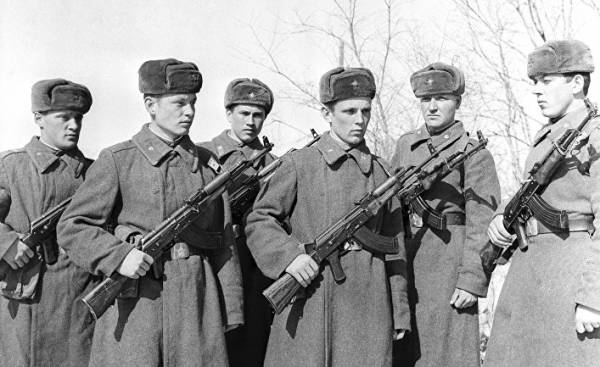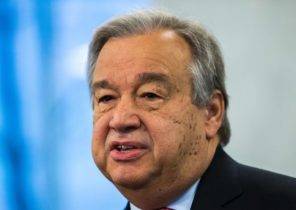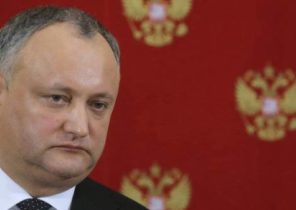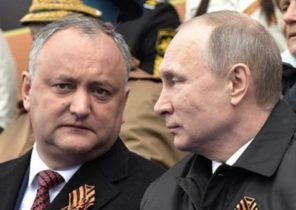
In 1969, the two pillars of the Communist bloc, the Soviet Union and people’s Republic of China, nearly started a full-scale war with each other. The years of tension between the two countries, which in the past were the most faithful allies finally turned collisions on the long common border. Although in the end, the tensions gradually disappeared, it’s worth thinking about what could happen if these two States went to war with each other.
March 2, 1969 Chinese military ambushed and fired on Soviet border guards patrolling the damanskii island on the Ussuri river. As a result of the attack, which occurred just 200 kilometres from a major Soviet city of Khabarovsk, 50 Soviet soldiers were killed and many were injured. Moscow was sure that the attack was planned in advance, because Beijing has sent a detachment of special purpose. Ill-treatment of Chinese wounded Soviet border guards led the Soviet authorities into a rage.
March 15, Soviet guards carried out a counterattack on the island and in its vicinity and, according to the CIA, killed “hundreds” of Chinese troops. Clashes continued in the spring and summer, and by August, CIA Director Richard Helms (Richard Helms) told the press that the Soviet leadership had appealed to the governments of several countries in an attempt to find out their opinions regarding a preemptive strike on China.
Although the crisis between the Soviet Union and China eventually subsided, what would have happened if this hadn’t happened? As wrote Robert Farley (Robert Farley), the Soviet Union believed the Chinese leadership was “absolutely insane” and possibly wanted to destroy growing problem in the Bud (would allow it to provide security in the long term is another question). While China, apparently, did not want war and did not have sufficient resources for its conduct, the Soviet Union seriously considered the possibility.
Since the first signs of a split in the early 1960s, the Soviet Union has steadily increased the number of its ground forces in the region. The number of combat units has increased from 13 in 1965 to 21 divisions in 1969. Although this may seem quite considerable force, they are still not enough to effectively patrol the border length in four thousand kilometers. Soviet troops concentrated in this region were mainly focused on the defense of machine gun-artillery division, in which it was not possible to effectively conduct the offensive. Meanwhile, according to estimates of the Department of Chinese troops in Manchuria consisted of two divisions of the border guards, 24 infantry divisions, two armored divisions and six artillery divisions.
If the Soviet Union decided to start a war, he would have two options. The first option suggests a traditional tank offensive in Manchuria, where was concentrated most of the Chinese industry, combined with a limited nuclear strike against Chinese nuclear forces and facilities for conducting nuclear research. In 1969, the attack of the Soviet troops in Manchuria would be offensive to the Japanese, which occurred in the same region in 1945, and, most likely, it would be conducted along the same routes. The attack against the Chinese likely would be more moderate in scope in 1945 attack on the Japanese carried out the 1.5 million Soviet troops. In 1969, in carrying out such an attack likely would have been involved two times less people, but it would be applied to modern weapons, artillery, tactical aircraft, and perhaps even tactical nuclear weapons.
The second option implied the nuclear strikes on the objects of a new Chinese program to develop nuclear weapons, but without the invasion of Manchuria. China has tested its first nuclear device in 1964 and held its first underground nuclear test in 1969. It’s unclear whether China could use its nuclear weapons in the war against the Soviet Union, but Moscow did not want to test it on my own experience. One of the main issues was whether the Soviet Union is ready to accompany the attack on Chinese nuclear facilities nuclear strike on Beijing and the Chinese leadership. Just one shot of Soviet Intercontinental ballistic missiles SS-8 with a thermonuclear warhead with a capacity of 2.3 megatons could wipe Beijing from the face of the earth and destroy more than half of its 7.6 million residents.
The positive side was that the attack of the Soviet Union would strengthen both nuclear and conventional forces Moscow. The Soviet army was able to rapidly move on the battlefield, putting a modern tank force against a poorly armed Chinese infantry and outdated tanks.
The negative side was that a nuclear strike against China would cause an extremely negative reaction from the international community. Attack on Manchuria could also contribute to the implementation of China’s strategy of “people’s war”, which was to slow the dispersion of forces of the aggressor through the actions of the Chinese army and peasant militias. The Chinese leadership, which has already demonstrated its bloodlust against their own people, would not hesitate to bring millions of people to sacrifice in the war against the Soviet Union. From the point of view of the Soviet Union, the endless war with China had clear goals. Attack of the Soviets against China turned out to be a tactical success but a strategic defeat — or, worse, not time-limited and strategic obligations, with which Afghanistan would have seemed child’s play.
War with China would also weaken the position of the Soviet Union in Europe. In order to gather troops for offensive war, Moscow had to send to the East tank armies, which were on the bases in the Warsaw Pact countries and in the European part of Russia. This could give courage to the activists in Poland, Czechoslovakia and Hungary, who could again try to overthrow the Soviet yoke and this time to succeed.
As for China, he had no reason to start a war with a country that possesses significant advantages in terms of both conventional and nuclear forces. China is a huge country with a large army and people’s militia forces — could not lose such a war, but he had no offensive forces in order to win it. A war that would have ended the occupation of Manchuria and the destruction of Beijing would negate all the so-called achievements of the great leap forward and the Cultural revolution. Although sooner or later Beijing would be restored, and Manchuria is conquered from the Soviet Union, this war would not give China any advantage, turning another battle for survival.
De-escalation of the Sino-Soviet crisis of 1969 helped to avoid what could become another large-scale destructive war of the twentieth century. The current friendly relations between Moscow and Beijing are a reflection of the crisis and the realization that these countries better to be friends than enemies. And now Moscow is more interested in this than ever given the rapid military and economic progress of China in recent 30 years, next time, in case of collision of Russia and China, already the Kremlin may be in a vulnerable position.
Kyle Mizokami is a specialist in the field of defense and national security. Lives and works in San Francisco, and his articles are published in such publications as the Diplomat, Foreign Policy, War is Boring and the Daily Beast. In 2009, he became one of the founders of the blog Japan Security Watch.







